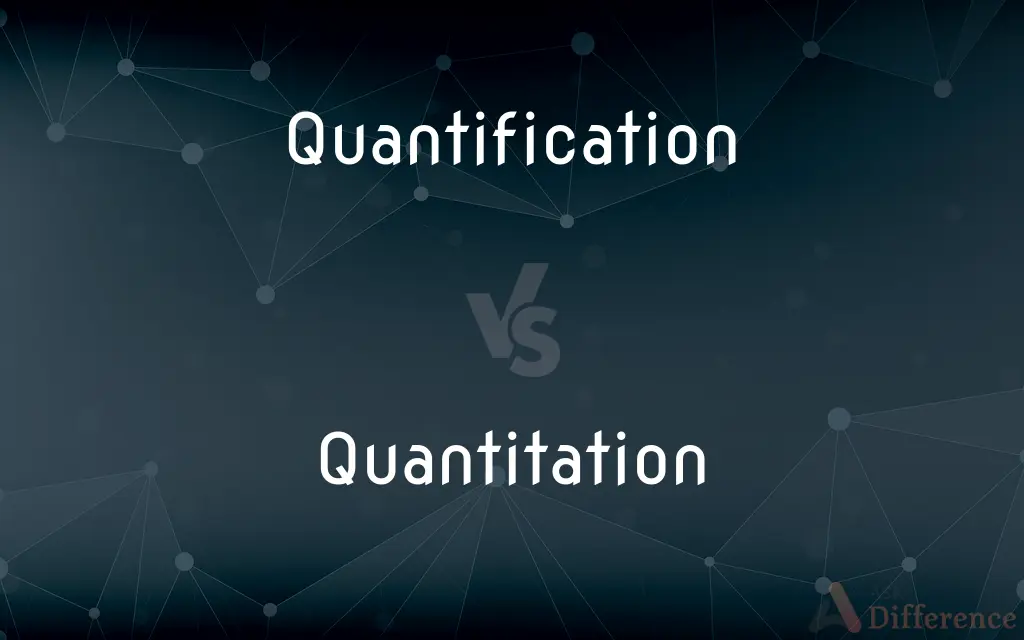Quantification vs. Quantitation — What's the Difference?
By Maham Liaqat & Fiza Rafique — Updated on April 6, 2024
Quantification is the process of measuring or expressing something in numerical terms, while quantitation specifically refers to determining the quantity of a substance.

Difference Between Quantification and Quantitation
Table of Contents
ADVERTISEMENT
Key Differences
Quantification is a broad term that encompasses the act of measuring, counting, or expressing something in numerical terms. It's applicable in various contexts, from scientific research to everyday life, such as quantifying the amount of traffic on a road. On the other hand, quantitation is a term more specifically used in scientific and technical fields, particularly in chemistry and biology, to refer to the process of determining the amount or concentration of a physical, chemical, or biological substance.
While quantification can refer to any act of measuring or defining the size, amount, or scale of something in numerical terms, quantitation often involves precise measurements and is used in contexts where accuracy in determining the quantity of a substance is crucial. For example, quantitation methods are critical in drug development for measuring concentrations of drugs and their metabolites in biological fluids.
Quantification methods can vary widely, from simple counts and measurements to complex statistical analyses. It is used not only in the sciences but also in fields such as economics, sociology, and history, illustrating its versatility. Quantitation, however, typically involves specialized techniques and instruments, such as spectrophotometry or chromatography, highlighting its more focused application.
The term quantification is often used in a broader narrative or analytical context, implying a more general process of converting qualitative data into quantitative data. This could include tasks such as quantifying the economic impact of a policy. Conversely, quantitation is used in contexts requiring rigorous methodology to precisely measure quantities, emphasizing its role in scientific accuracy and specificity.
Both quantification and quantitation contribute to our understanding and analysis of the world by allowing us to measure and express various phenomena in numerical terms. However, their use and context—quantification being more general and quantitation being more specific and technical—highlight important distinctions in their application and purpose.
ADVERTISEMENT
Comparison Chart
Definition
Measuring or expressing something in numerical terms.
Determining the quantity of a substance.
Scope
Broad, applies in various contexts.
Specific, often used in scientific measurements.
Methodology
Can vary widely, from simple counts to complex analyses.
Involves precise measurements, often with specialized instruments.
Application Fields
Sciences, economics, sociology, history, and more.
Chemistry, biology, pharmacology.
Purpose
To convert qualitative data into quantitative.
To measure substance concentrations accurately.
Compare with Definitions
Quantification
Application of mathematical and statistical techniques to analyze phenomena.
Quantification in environmental science can reveal patterns of climate change.
Quantitation
A precise measurement of the amount or concentration of a physical, chemical, or biological substance.
Quantitation of a protein sample is essential for biochemical studies.
Quantification
The act of determining, measuring, or expressing the size, amount, or degree of something in numerical terms.
Quantification of traffic flow helps in urban planning.
Quantitation
Often involves instruments like spectrophotometers or chromatographs.
Quantitation of DNA concentration is commonly performed using spectrophotometry.
Quantification
A method used in various scientific and non-scientific contexts to understand phenomena.
The quantification of social media trends involves statistical analysis of user data.
Quantitation
A specialized process in scientific research for measuring quantities.
Accurate quantitation is crucial in pharmaceutical research to determine drug dosages.
Quantification
The expression of something as a quantity or number.
Quantification of voter turnout is crucial for understanding election dynamics.
Quantitation
The use of specific techniques to determine substance quantities accurately.
Quantitation in drug testing involves identifying and measuring the concentrations of drugs.
Quantification
The process of converting qualitative data into quantitative data for analysis.
Quantification of historical economic impacts requires analyzing numerous data sources.
Quantitation
Application in laboratory settings to ensure measurement accuracy.
Quantitation methods are critical in environmental monitoring for pollutants.
Quantification
To determine or express the quantity of.
Quantitation
To determine or measure the quantity of.
Quantification
(Logic) To limit the variables of (a proposition) by prefixing an operator such as all or some.
Quantitation
The process of quantitating.
Quantification
The act of quantifying.
Quantitation
The result of a process of quantitating.
Quantification
(economics) The expression of an economic activity in monetary units.
Quantification
(logic) A limitation that is imposed on the variables of a proposition.
Quantification
Modification by a reference to quantity; the introduction of the element of quantity.
The quantification of the predicate belongs in part to Sir William Hamilton; viz., in its extension to negative propositions.
Quantification
A limitation imposed on the variables of a proposition (as by the quantifiers `some' or `all' or `no')
Quantification
The act of discovering or expressing the quantity of something
Common Curiosities
Can quantification and quantitation be used interchangeably?
While they can sometimes overlap, they generally should not be used interchangeably due to the specific technical meaning of quantitation in scientific contexts.
What is quantitation?
Quantitation specifically refers to the precise measurement of the quantity of a substance, often in scientific or technical contexts.
Is quantitation only relevant in laboratory settings?
While often used in laboratories, quantitation is also relevant in field settings where precise measurements of substances are required, such as environmental monitoring.
How does quantification aid in decision-making?
By converting information into numerical data, quantification helps in analyzing trends, making predictions, and informing policy or business decisions.
Why is quantitation important in research?
Quantitation provides precise, accurate measurements of substances, crucial for scientific experiments, research findings, and applications like drug development.
What role does quantification play in social sciences?
In social sciences, quantification converts social phenomena into numerical data for analysis, aiding in understanding trends, behaviors, and outcomes.
What tools are commonly used in quantitation?
Tools such as spectrophotometers, chromatographs, and mass spectrometers are commonly used in quantitation to measure substance concentrations accurately.
How is quantitation used in pharmacology?
In pharmacology, quantitation is used to measure drug concentrations in biological fluids, crucial for determining dosages, efficacy, and safety.
What is quantification?
Quantification is the process of measuring or expressing something in numerical terms, applicable across various fields and contexts.
How do quantification and quantitation differ in application?
Quantification is broadly applied in numerous fields for general measurements, while quantitation is more specialized, used primarily in scientific research to measure specific substances.
Does quantification only apply to physical quantities?
No, quantification can apply to abstract concepts as well, such as quantifying the level of happiness or satisfaction in a population.
Can the principles of quantitation be applied in non-scientific fields?
The principles of precision and accurate measurement can inform practices in non-scientific fields, but quantitation is primarily a scientific process.
How do advancements in technology affect quantitation?
Technological advancements enhance the accuracy, efficiency, and capabilities of quantitation methods, enabling more precise measurements and broader applications.
Are there ethical considerations in quantification and quantitation?
Yes, ethical considerations include ensuring accuracy, respecting privacy in data collection, and avoiding misuse of quantitative data.
What challenges are associated with quantification?
Challenges include ensuring accuracy, dealing with complex data sets, and the potential for oversimplification of complex phenomena.
Share Your Discovery

Previous Comparison
Legacy vs. Tradition
Next Comparison
Respective vs. RelevantAuthor Spotlight
Written by
Maham LiaqatCo-written by
Fiza RafiqueFiza Rafique is a skilled content writer at AskDifference.com, where she meticulously refines and enhances written pieces. Drawing from her vast editorial expertise, Fiza ensures clarity, accuracy, and precision in every article. Passionate about language, she continually seeks to elevate the quality of content for readers worldwide.













































